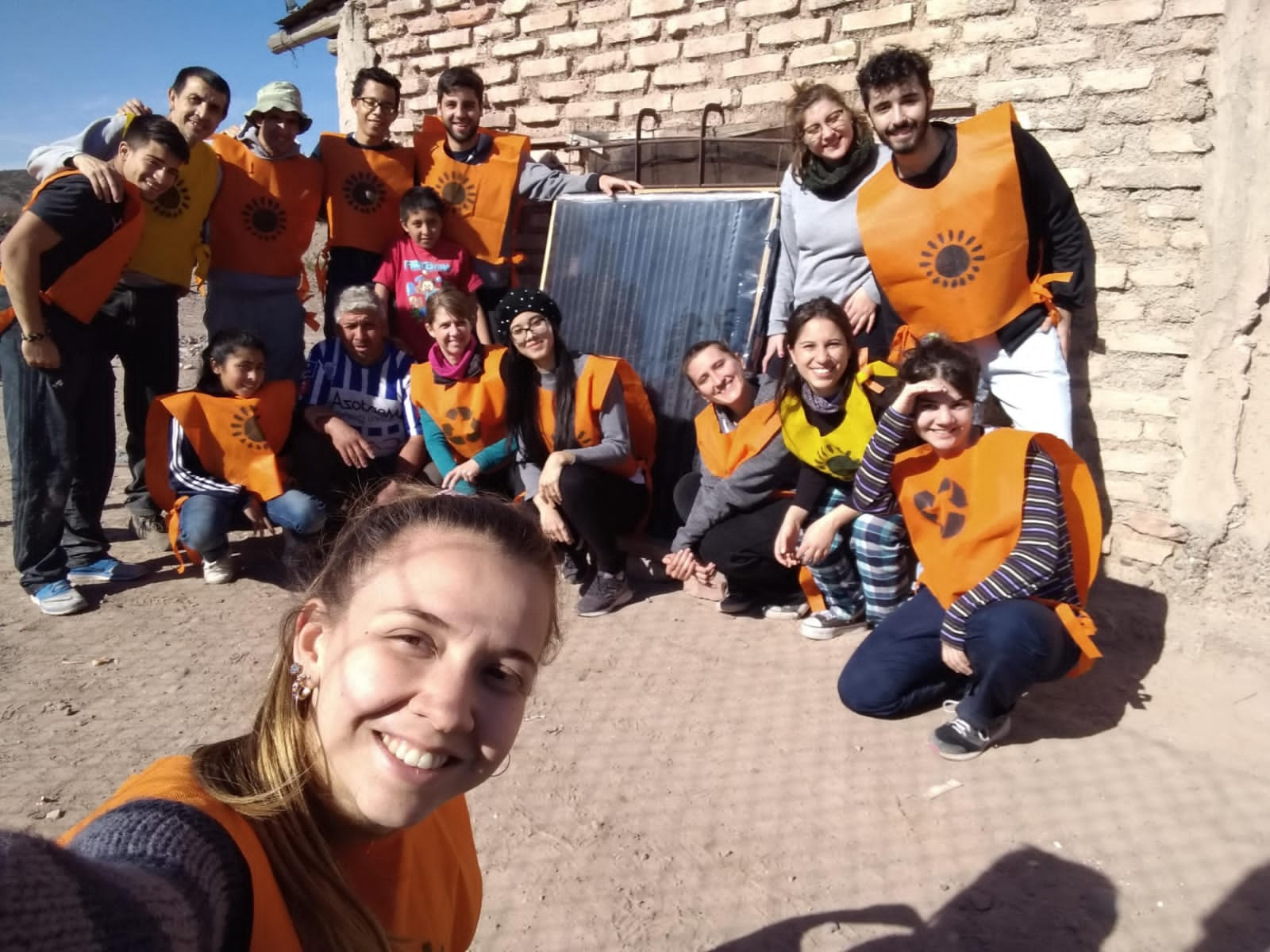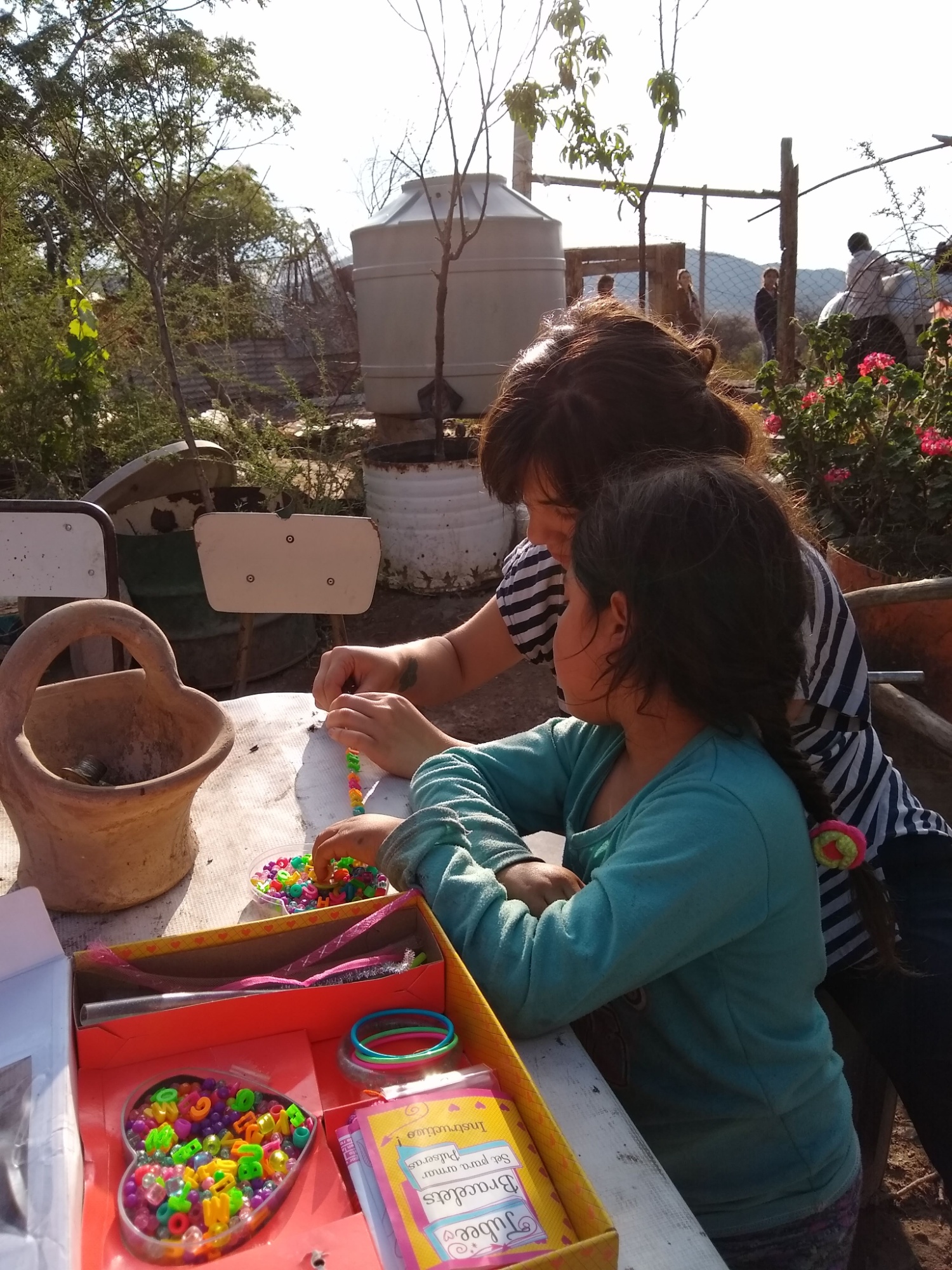Reimagining Tomorrow's Climate Change Action
.png)
Since graduating from UWC, Aldi (UWC Dilijan, 2016-2018) has been busy reshaping the concept of sustainability in her hometown of Mendoza, Argentina, applying it to almost every project she participates in and sharing best practices with her community. She has spent countless hours with “Ducha de Sol”, “Proyecto SICLI”, and “Eco Bomba”. Three projects that aim at providing ecological solutions to different aspects of the local housing crisis.
Ducha de sol focuses on creating boilers and heaters out of recycled materials, SICLI generates a sustainable and economical refrigeration system for homes and cities, and Ecobomba develops sustainable and economical water pumping systems.
She has also volunteered with Agricultores Sociales, a community garden and healthy eating educational initiative that provides healthy ingredients to local soup kitchens. This project addresses a fundamental problem in the community - malnutrition - and provides an educational platform for the community to learn and teach each other about healthier and more sustainable practices regarding food.
As an artist, these initiatives have inevitably led Aldi to be a part of the production of “CIRCULAR”, a documentary on how indigenous groups in Argentina find different solutions to tackling climate change through their ancestral knowledge.
Aldi has also combined her passion for art and sustainability into running different thrift shop initiatives, aiming to re-signify clothing and promote a more sustainable fashion consumption.
Last but not least, Aldi has been a key part of UWC Argentina’s communications team, generating social media content, engaging current students, promoting the movement to potential candidates, as well as facilitating selection exams. Currently, she is part of the group of UWC Dilijan alumni participating in an internship for the Aurora Prize by postulating Humanitarian Heroes from the South American region.
We had the chance to catch up with Aldi and hear about her motivations behind all the work she is doing to build socially and ecologically sustainable solutions to the climate crisis in her home community. We also used this as an opportunity to hear Aldi’s reflections on this year’s UWC Day theme, ‘Reimagine Tomorrow’ - both from her perspective as an artist and as a climate activist.
Introductions first, where are you from, and how did you end up at UWC?
I’m From Mendoza, a city located in the Andes of Argentina. I ended up at UWC thanks to a series of different circumstances that made me want to do something about my nonconformity within my context. On the one hand, there was my dissatisfaction with the education system in my home town of Mendoza. I was one of the worst students, but it did not bother me; I knew that it was not an education system that really evaluated processes and learning. On the other hand, I had a deep need to explore everything beyond the known; from a very young age, I dreamed of travelling. When a teacher told me about UWC, I could not believe it - an international school made to establish connections, break barriers, and learn through experience. It was exactly what I wanted to be part of to eventually help evolve the education system in my home country of Argentina.
Of all the issues the world faces and that you could have tackled in your community - how and why did you choose to focus your work on the climate crisis?
Many times it has been said that the climate crisis affects all of us, and even though there is some truth in this, we are all affected to differing extents and depths. Those in third-world countries face impossible situations due to this evolutionary time we are living in as a society; the climatic crisis exacerbates these issues. The inability to access clean water, heating, refrigeration or even a hot shower are common challenges in Argentina. With the climate crisis, everything has become even more complicated; and ironically it is the people who suffer the most from inequality and harmful environmental practices who end up having to take the most responsibility for it. The situation we are experiencing around the world touches me very deeply, so I feel that if I can do something about it, no matter how small, I will. Sometimes thinking of doing something individual to counteract climate change seems impossible, but it is not. The moment I decided to do something about the things that annoy me, was when projects that are generating great socio-environmental impact began to emerge. Sometimes the impact that one can generate individually is not measured in numbers, because often that impact means sharing good practices, generating a dialogue on environmental awareness, promoting reuse and reduction, and non-consumerism where possible.
affects all of us, and even though there is some truth in this, we are all affected to differing extents and depths. Those in third-world countries face impossible situations due to this evolutionary time we are living in as a society; the climatic crisis exacerbates these issues. The inability to access clean water, heating, refrigeration or even a hot shower are common challenges in Argentina. With the climate crisis, everything has become even more complicated; and ironically it is the people who suffer the most from inequality and harmful environmental practices who end up having to take the most responsibility for it. The situation we are experiencing around the world touches me very deeply, so I feel that if I can do something about it, no matter how small, I will. Sometimes thinking of doing something individual to counteract climate change seems impossible, but it is not. The moment I decided to do something about the things that annoy me, was when projects that are generating great socio-environmental impact began to emerge. Sometimes the impact that one can generate individually is not measured in numbers, because often that impact means sharing good practices, generating a dialogue on environmental awareness, promoting reuse and reduction, and non-consumerism where possible.
When it comes to tackling the climate crisis - why is the idea of ‘Reimagining Tomorrow’ important? How do you think this theme can inspire the kind of change we need to see in the world?
I think it's essential to challenge ourselves to ‘Reimagine Tomorrow’ because we live in a world with so many structures that constructed us in a certain way and sometimes it's hard to imagine things differently. But taking this idea as a challenge, will allow us to create something new from scratch. It's not about solving problems, or focusing on what we have done wrong, but thinking: ‘if we could reimagine the future, how would it look?’ It's about placing our focus even further into the future; I’ve seen many solutions to our current problems where the objective is to offset the issues instead of going further and regenerating. We have to create a new world focusing on evolving, not solving—learning from the past and growing as humanity from there.
Finally, as someone with a particular interest in art, how do you think art can be used as a tool to help us to ‘Reimagine Tomorrow’ - and to start working towards a better 'tomorrow'? Why is art influential in this way?
 For me, art is everything we create, everything we, as humans, bring to life from our minds. Art allows us to be innovative with how we live, how we eat, and how we express ourselves. There is nothing more liberating than the coherence between thinking, feeling and doing. Although art many times is understood as a synonym of entertainment, it's not always like that. Reimagining Tomorrow, for me, means planning what kind of world we want to live in and what actions we have to do to get to see and enjoy that final piece. Looking at the world as the perfect balance between nature and thinking about what we can add to it as humanity would be the most beautiful piece of art we can create. To understand that sometimes minimal interventions from society can result in the most beautiful results for the world. We have to evolve to appreciate our surroundings and comprehend when it is necessary to act or not. We have to be clear about what kind of world we want to live in to better inform our actions and decisions.
For me, art is everything we create, everything we, as humans, bring to life from our minds. Art allows us to be innovative with how we live, how we eat, and how we express ourselves. There is nothing more liberating than the coherence between thinking, feeling and doing. Although art many times is understood as a synonym of entertainment, it's not always like that. Reimagining Tomorrow, for me, means planning what kind of world we want to live in and what actions we have to do to get to see and enjoy that final piece. Looking at the world as the perfect balance between nature and thinking about what we can add to it as humanity would be the most beautiful piece of art we can create. To understand that sometimes minimal interventions from society can result in the most beautiful results for the world. We have to evolve to appreciate our surroundings and comprehend when it is necessary to act or not. We have to be clear about what kind of world we want to live in to better inform our actions and decisions.
